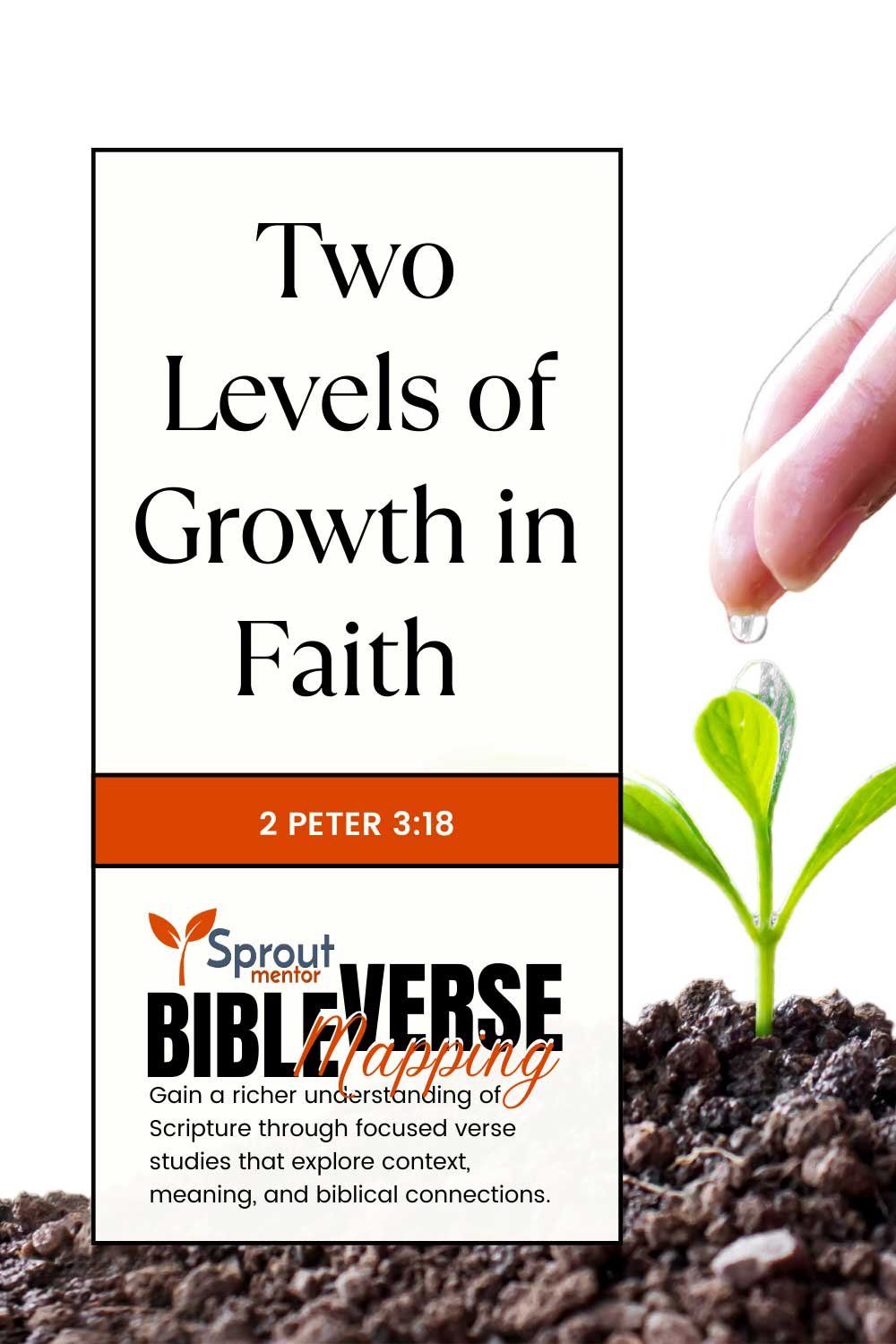Two Levels of Growth in Faith (2 Peter 3:18)

Share This Blog Post On:
Short on time, but big on faith? We break down complex topics into easy-to-understand chunks, making the Bible accessible to everyone. Join us for answers to your Bible questions and encouragement for your daily walk with God. Click here to grow your faith, one byte at a time!
“But grow in grace, and in the knowledge of our Lord and Savior Jesus Christ. To him be glory both now and forever. Amen.” (2 Peter 3:18)
Growth in faith is not accidental; it is intentional and requires effort. This verse presents us with a call to grow in our faith in the Lord Jesus Christ in the two dimensions below.
#1 – Growth in Grace
Grace is foundational to our relationship with God. It is the unmerited favor that makes salvation possible. It’s the quality of God’s character that offers blessings and access to His presence despite our unworthiness. Grace is not just a one-time gift but a resource to be nurtured and grown in. While grace is freely given, certain behaviors and attitudes can hinder its growth in our lives:
- Continuing in Sin: Paul addresses this in Romans 6:1-2, asking, “Shall we continue in sin, that grace may abound? God forbid.” Grace is not a license to sin but the power to overcome sin. Jude also warns against turning “the grace of our God into lasciviousness” (Jude 1:4).
- Ignorance of Grace: A lack of understanding about grace—its purpose and value—can lead to spiritual stagnation. Just as we value tangible gifts, we must treasure the grace of God, seeking to understand its depths through Scripture and prayer.
- Failure to Grow in Favor with God: Jesus provides a model for us, as He “increased in wisdom and stature, and favor with God and man” (Luke 2:52). Growth in grace involves becoming more aligned with God’s will through obedience and submission.
Grace is the characteristic of God that motivates Him to draw sinners into His presence despite their unworthiness. It is through grace that we experience the richness of His blessings and the strength to live in obedience. Paul reminds us, “For by grace are ye saved through faith; and that not of yourselves: it is the gift of God” (Ephesians 2:8-9). This gift should not be taken lightly but cherished and cultivated. To grow in grace is not to increase the amount of grace God bestows—His grace is infinite and unchanging—but to deepen our understanding and application of it. This requires:
- Prayer and Communion with God: Regular communication with God strengthens our reliance on His grace.
- Studying the Word: Scripture is the source of grace-filled wisdom and guidance.
- Living a Life of Gratitude: Recognizing grace as an undeserved gift cultivates a heart of thankfulness.
#2 – Growth in the Knowledge of Our Lord
Growing in the knowledge of Jesus Christ involves more than intellectual understanding; it is about embodying His mind and character. This growth enables us to live in alignment with God’s will and make decisions grounded in His truth. Peter’s call to grow in knowledge is a call to intimacy with Christ. This involves knowing who He is, what He has done, and how He teaches us to live. Paul describes this as growing “unto a perfect man, unto the measure of the stature of the fullness of Christ” (Ephesians 4:13) in the following ways:
- Obedience to God’s Word: Obedience is foundational to growth. Jesus instructed His disciples to teach others to observe all He had commanded (Matthew 28:20). The apostles saw themselves as stewards of this knowledge, preaching “Jesus Christ and Him crucified” (1 Corinthians 2:2).
- Diligent Study of Scripture: Like the Bereans who “searched the Scriptures daily” (Acts 17:11), we must be intentional about studying God’s Word. A solid understanding of Scripture guards us against false teachings and equips us to live righteously.
- Dependence on Jesus: Hebrews 12:2 reminds us to look to Jesus, “the author and finisher of our faith.” Growth in knowledge requires reliance on Him as our ultimate teacher and guide.
- Seeking the Holy Spirit’s Guidance: The Holy Spirit is the Spirit of truth who leads us into all truth (John 16:13). He reveals the mysteries of God and empowers us to live according to His will.
- Living by Faith: Faith is not static; it must be exercised and nurtured through repentance, humility, diligence, and obedience. These principles establish us in the knowledge of Christ.
In conclusion, without diligence, we risk becoming stagnant, losing sight of our identity in Christ, and falling prey to complacency. James warns against being hearers of the Word only, likening it to someone who looks at their reflection in a mirror but immediately forgets their appearance (James 1:23-24). This lack of intentional action leads to no real transformation. Additionally, Jesus highlighted the importance of readiness and activity in faith by commending those who will be found working when the Master returns (Matthew 24:46).
Growth in faith is a lifelong process, requiring daily effort and intentionality. As we grow in grace, we experience the transformative power of God’s unmerited favor, enabling us to overcome sin and live in obedience. As we grow in the knowledge of our Lord, we deepen our relationship with Christ, aligning our thoughts and actions with His will. When we commit to this journey, we not only strengthen our faith but also inspire others to follow Christ. The result is a legacy of faithfulness—a cloud of witnesses that testifies to God’s glory.
Continue Reading More On:
|







